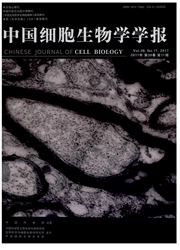

 中文摘要:
中文摘要:
体外培养的人喉癌细胞系Hep-2细胞用10ng/ml干扰素-γ处理不同时间后,利用细胞计数、细胞凋亡-DNALadder分析及半定量RT-PCR方法,探讨干扰素-γ对Hep-2细胞增殖及凋亡的影响并初步分析其作用分子机制。结果显示,与不处理对照细胞相比,干扰素-γ处理后第2天起Hep-2N胞增殖明显变慢;细胞凋亡分析显示,干扰素-γ处理后Hep-2细胞基因组DNA电泳图谱呈梯状分布;半定量RT-PCR分析显示,干扰素-γ处理诱导Hep-2细胞IFII6基因表达。结果表明,干扰素-γ抑制Hep-2细胞增殖诱导Hep-2细胞凋亡,其机制可能与干扰素-γ诱导IFII6基因表达有关。
 英文摘要:
英文摘要:
human laryngeal cell line Hep-2 cells were cultured and treated with 10 ng/ml IFN-γ for different time. After IFN-γ treatment, cell counting, cell apoptosis-DNA ladder analysis and semi-quantitative RTPCR methods were used to explore the influences of IFN-γ on the proliferation and apoptosis of Hep-2 cells and its preliminary molecular mechanism was analyzed simultaneously. The cell growth assay result showed that from the second day on Hep-2 cells treated with IFN-γ proliferated obviously slower than the untreated control cells. Cell apoptosis analysis showed that the genomic DNA of Hep-2 cells displayed as the DNA ladder pattern in gel electrophoresis when the Hep-2 cells were treated with IFN-γ. Semi-quantitative RT-PCR analysis showed that the expression of lFII6 gene was induced in Hep-2 cells after treated with IFN-γ. Based on the above results, it was concluded that IFN-γ could inhibit Hep-2 cells proliferation and induce Hep-2 cells apoptosis, and the mechanism for IFN-γ inhibiting Hep-2 cells proliferation and inducing Hep-2 cells apoptosis is probably related to the IFN-γ- induced IFII6 gene expression.
 同期刊论文项目
同期刊论文项目
 同项目期刊论文
同项目期刊论文
 期刊信息
期刊信息
